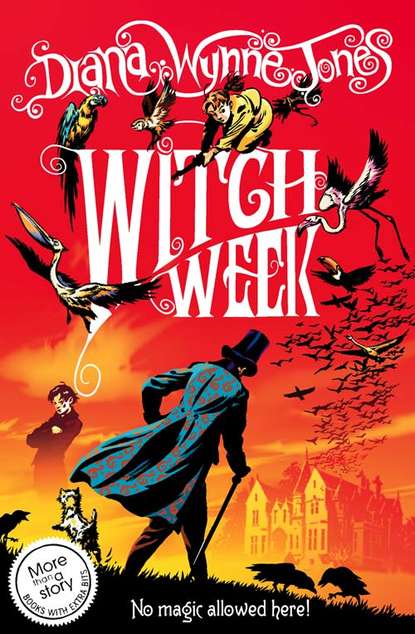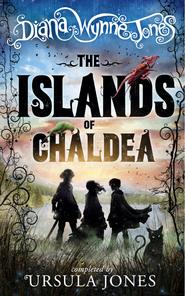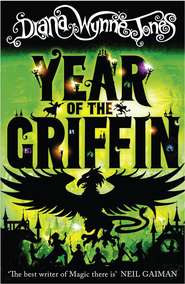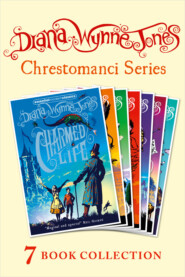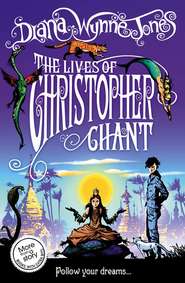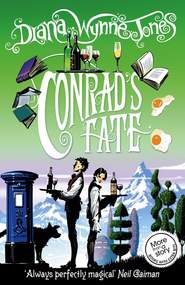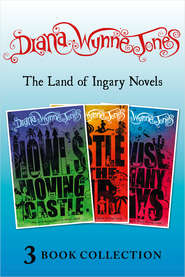По всем вопросам обращайтесь на: info@litportal.ru
(©) 2003-2024.
✖
Witch Week
Настройки чтения
Размер шрифта
Высота строк
Поля
At the back of the room, Brian Wentworth wrote, sighing, Timetables just run away with me, that is my problem. During Geography, I planned a bus journey from London to Baghdad via Paris. Next lesson I shall plan the same journey via Berlin.
Nan Pilgrim meanwhile was scrawling,
This is a message to the person who reads our journals. Are you Miss Cadwallader, or does Miss Cadwallader make Mr Wentworth do it?
She stared at what she had written, rather taken aback at her own daring. This kind of thing happened to her sometimes. Still, she thought, there were hundreds of journals and hundreds of daily entries. The chances of Miss Cadwallader reading this one had to be very small – particularly if she went on and made it really boring.
I shall now be boring, she wrote. Teddy Crossley’s real name is Harold, but he got called Teddy out of the hymn that goes ‘Gladly my cross I’d bear.’ But of course everyone sings ‘Crossley my glad-eyed bear.’ Mr Crossley is glad-eyed. He thinks everyone should be upright and honourable and interested in Geography. I am sorry for him.
But the one who was best at making his journal boring was Charles Morgan. His entry read,
I got up. I felt hot at breakfast. I do not like porridge. Second lesson was Woodwork but not for long. I think we have Games next.
Looking at this, you might think Charles was either very stupid or very muddled, or both. Anyone in 2Y would have told you that it had been a chilly morning and there had been cornflakes for breakfast. Second lesson had been PE, during which Nan Pilgrim had so much amused Theresa Mullett by failing to jump the horse, and the lesson to come was Music, not Games. But Charles was not writing about the day’s work. He really was writing about his secret feelings, but he was doing it in his own private code so that no one could know.
He started every entry with I got up. It meant, I hate this school. When he wrote I do not like porridge, that was actually true, but porridge was his code-word for Simon Silverson. Simon was porridge at breakfast, potatoes at lunch, and bread at tea. All the other people he hated had code-words too. Dan Smith was cornflakes, cabbage and butter. Theresa Mullett was milk.
But when Charles wrote I felt hot, he was not talking about school at all. He meant he was remembering the witch being burnt. It was a thing that would keep coming into his head whenever he was not thinking of anything else, much as he tried to forget it.
He had been so young that he had been in a pushchair. His big sister Bernadine had been pushing him while his mother carried the shopping, and they had been crossing a road where there was a view down into the Market Square. There were crowds of people down there, and a sort of flickering. Bernadine had stopped the pushchair in the middle of the street in order to stare. She and Charles had just time to glimpse the bone-fire starting to burn, and they had seen that the witch was a large fat man. Then their mother came rushing back and scolded Bernadine on across the road.
“You mustn’t look at witches!” she said. “Only awful people do that!” So Charles had only seen the witch for an instant. He never spoke about it, but he never forgot it. It always astonished him that Bernadine seemed to forget about it completely. What Charles was really saying in his journal was that the witch came into his head during breakfast, until Simon Silverson made him forget again by eating all the toast.
When he wrote Woodwork second lesson, he meant that he had gone on to think about the second witch – which was a thing he did not think about so often. Woodwork was anything Charles liked. They only had Woodwork once a week, and Charles had chosen that for his code on the very reasonable grounds that he was not likely to enjoy anything at Larwood House any oftener than that. Charles had liked the second witch. She had been quite young and rather pretty, in spite of her torn skirt and untidy hair. She had come scrambling across the wall at the end of the garden and stumbled down the rockery to the lawn, carrying her smart shoes in one hand. Charles had been nine years old then, and he was minding his little brother on the lawn. Luckily for the witch, his parents were out.
Charles knew she was a witch. She was out of breath and obviously frightened. He could hear the yells and police whistles in the houses behind. Besides, who else but a witch would run away from the police in the middle of the afternoon in a tight skirt? But he made quite sure. He said, “Why are you running away in our garden?”
The witch rather desperately hopped on one foot. She had a large blister on the other foot, and both her stockings were laddered. “I’m a witch,” she panted. “Please help me, little boy!”
“Why can’t you magic yourself safe?” Charles asked.
“Because I can’t when I’m this frightened!” gasped the witch. “I tried, but it just went wrong! Please, little boy – sneak me out through your house and don’t say a word, and I’ll give you luck for the rest of your life. I promise.”
Charles looked at her in that intent way of his which most people found blank and nasty. He saw she was speaking the truth. He saw, too, that she understood the look as very few people seemed to. “Come in through the kitchen,” he said. And he led the witch, hobbling on her blister in her laddered stockings, through the kitchen and down the hall to the front door.
“Thanks,” she said. “You’re a love.” She smiled at him while she put her hair right in the hall mirror, and, after she had done something to her skirt that may have been witchcraft to make it seem untorn again, she bent down and kissed Charles. “If I get away, I’ll bring you luck,” she said. Then she put her smart shoes on again and went away down the front garden, trying hard not to limp. At the front gate, she waved and smiled at Charles.
That was the end of the part Charles liked. That was why he wrote But not for long next. He never saw the witch again, or heard what had happened to her. He ordered his little brother never to say a word about her – and Graham obeyed, because he always did everything Charles said – and then he watched and waited for any sign of the witch or any sign of luck. None came.
It was next to impossible for Charles to find out what might have happened to the witch, because there had been new laws since he glimpsed the first witch burning. There were no more public burnings. The bone-fires were lit inside the walls of gaols instead, and the radio would simply announce: “Two witches were burnt this morning inside Holloway Gaol.” Every time Charles heard this kind of announcement he thought it was his witch. It gave him a blunt, hurtful feeling inside. He thought of the way she had kissed him, and he was fairly sure it made you wicked too, to be kissed by a witch.
He gave up expecting to be lucky. In fact, to judge from the amount of bad luck he had had, he thought the witch must have been caught almost straight away. For the blunt, hurtful feeling he had when the radio announced a burning made him refuse to do anything his parents told him to do. He just gave them his steady stare instead. And each time he stared, he knew they thought he was being nasty. They did not understand it the way the witch did. And, since Graham imitated everything Charles did, Charles’s parents very soon decided Charles was a problem child and leading Graham astray. They arranged for him to be sent to Larwood House, because it was quite near.
When Charles wrote Games, he meant bad luck. Like everyone else in 2Y, he had seen Mr Crossley had found a note. He did not know what was in the note, but when he looked up and caught Mr Crossley’s eye, he knew it meant bad luck coming.
Mr Crossley still could not decide what to do about the note. If what it said was true, that meant Inquisitors coming to the school. And that was a thoroughly frightening thought. Mr Crossley sighed and put the note in his pocket. “Right, everyone,” he said. “Put away your journals and get into line for Music.”
As soon as 2Y had shuffled away to the school hall, Mr Crossley sped to the staff room, hoping to find someone he could consult about the note.
He was lucky enough to find Miss Hodge there. As Theresa Mullett and Estelle Green had observed, Mr Crossley was in love with Miss Hodge. But of course he never let it show. Probably the only person in the school who did not seem to know was Miss Hodge herself. Miss Hodge was a small neat person who wore neat grey skirts and blouses, and her hair was even neater and smoother than Theresa Mullett’s. She was busy making neat stacks of books on the staff room table, and she went on making them all the time Mr Crossley was telling her excitedly about the note. She spared the note one glance.
“No, I can’t tell who wrote it either,” she said.
“But what shall I do about it?” Mr Crossley pleaded. “Even if it’s true, it’s such a spiteful thing to write! And suppose it is true. Suppose one of them is—” He was in a pitiable state. He wanted so badly to attract Miss Hodge’s attention, but he knew that words like witch were not the kind of words one used in front of a lady. “I don’t like to say it in front of you.”
“I was brought up to be sorry for witches,” Miss Hodge remarked calmly.
“Oh, so was I! We all are,” Mr Crossley said hastily. “I just wondered how I should handle it—”
Miss Hodge lined up another stack of books. “I think it’s just a silly joke,” she said. “Ignore it. Aren’t you supposed to be teaching 4X?”
“Yes, yes. I suppose I am,” Mr Crossley agreed miserably. And he was forced to hurry away without Miss Hodge having looked at him once.
Miss Hodge thoughtfully squared off another stack of books, until she was sure Mr Crossley had gone. Then she smoothed her smooth hair and hurried away upstairs to find Mr Wentworth.
Mr Wentworth, as Deputy Head, had a study where he wrestled with the timetable and various other problems Miss Cadwallader gave him. When Miss Hodge tapped on the door, he was wrestling with a particularly fierce one. There were seventy people in the school orchestra. Fifty of these were also in the school choir and twenty of those fifty were in the school play. Thirty boys in the orchestra were in various football teams, and twenty of the girls played hockey for the school. At least a third played basketball as well. The volleyball team were all in the school play. Problem: how do you arrange rehearsals and practices without asking most people to be in three places at once? Mr Wentworth rubbed the thin patch at the back of his hair despairingly.
“Come in,” he said. He saw the bright, smiling, anxious face of Miss Hodge, but his mind was not on her at all.
“So spiteful of someone, and so awful if it’s true!” he heard Miss Hodge saying. And then, merrily, “But I think I have a scheme to discover who wrote the note – it must be someone in 2Y. Can we put our heads together and work it out, Mr Wentworth?” She put her own head on one side, invitingly.
Mr Wentworth had no idea what she was talking about. He scratched the place where his hair was going and stared at her. Whatever it was, it had all the marks of a scheme that ought to be squashed. “People only write anonymous notes to make themselves feel important,” he said experimentally. “You mustn’t take them seriously.”
“But it’s the perfect scheme!” Miss Hodge protested. “If I can explain—”
Not squashed yet, whatever it is, thought Mr Wentworth. “No. Just tell me the exact words of this note,” he said.
Miss Hodge instantly became crushed and shocked. “But it’s awful!” Her voice fell to a dramatic whisper. “It says someone in 2Y is a witch!”
Mr Wentworth realised that his instinct had been right. “What did I tell you?” he said heartily. “That’s the sort of stuff you can only ignore, Miss Hodge.”
“But someone in 2Y has a very sick mind!” Miss Hodge whispered.
Mr Wentworth considered 2Y, including his own son Brian. “They all have,” he said. “Either they’ll grow out of it, or we’ll see them all riding round on broomsticks in the sixth form.” Miss Hodge started back. She was genuinely shocked at this coarse language. But she hastily made herself laugh. She could see it was a joke. “Take no notice,” said Mr Wentworth. “Ignore it, Miss Hodge.” And he went back to his problem with some relief.
Miss Hodge went back to her stacks of books, not as crushed as Mr Wentworth supposed she was. Mr Wentworth had made a joke to her. He had never done that before. She must be getting somewhere. For – and this was a fact not known to Theresa Mullett or Estelle Green – Miss Hodge intended to marry Mr Wentworth. He was a widower. When Miss Cadwallader retired, Miss Hodge was sure Mr Wentworth would be Head of Larwood House. This suited Miss Hodge, who had her old father to consider. For this, she was quite willing to put up with Mr Wentworth’s bald patch and his tense and harrowed look. The only drawback was that putting up with Mr Wentworth also meant putting up with Brian. A little frown wrinkled Miss Hodge’s smooth forehead at the thought of Brian Wentworth. Now there was a boy who quite deserved the way the rest of 2Y were always on to him. Never mind. He could be sent away to another school.
Meanwhile, in Music, Mr Brubeck was asking Brian to sing on his own. 2Y had trailed their way through ‘Here we sit like birds in the wilderness’. They had made it sound like a lament. “I’d prefer a wilderness to this place,” Estelle Green whispered to her friend Karen Grigg. Then they sang ‘Cuckaburra sits in the old gum tree’. That sounded like a funeral dirge.
“What’s a cuckaburra?” Karen whispered to Estelle.
“Another kind of bird,” Estelle whispered back. “Australian.”
“No, no, no!” shouted Mr Brubeck. “Brian is the only one of you who doesn’t sound like a cockerel with a sore throat!”
“Mr Brubeck must have birds on the brain!” Estelle giggled. And Simon Silverson, who believed, strongly and sincerely, that nobody was worthy of praise except himself, gave Brian a scathingly jeering look.
But Mr Brubeck was far too addicted to music to take any notice of what the rest of 2Y thought. “‘The Cuckoo is a Pretty Bird’,” he announced. “I want Brian to sing this to you on his own.”





